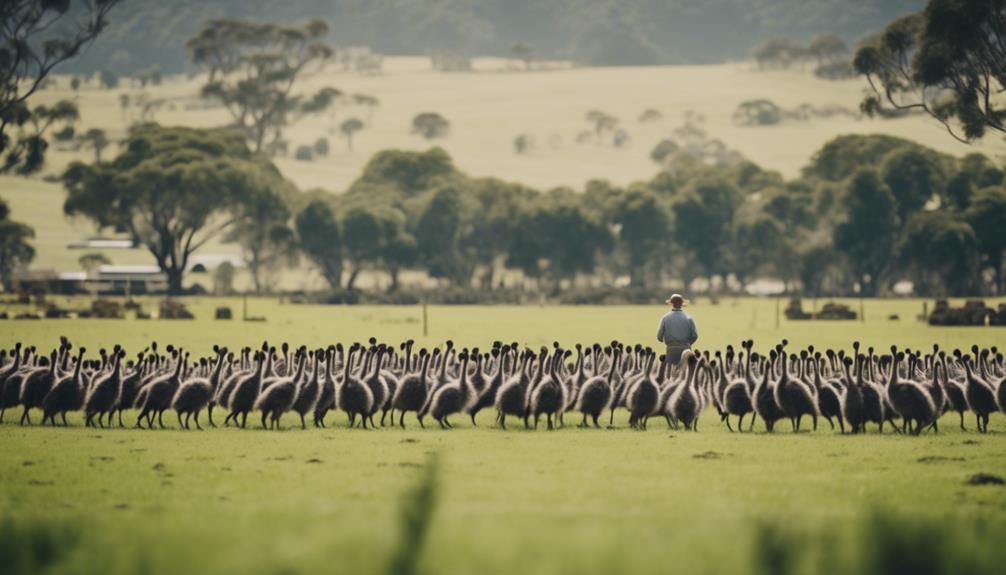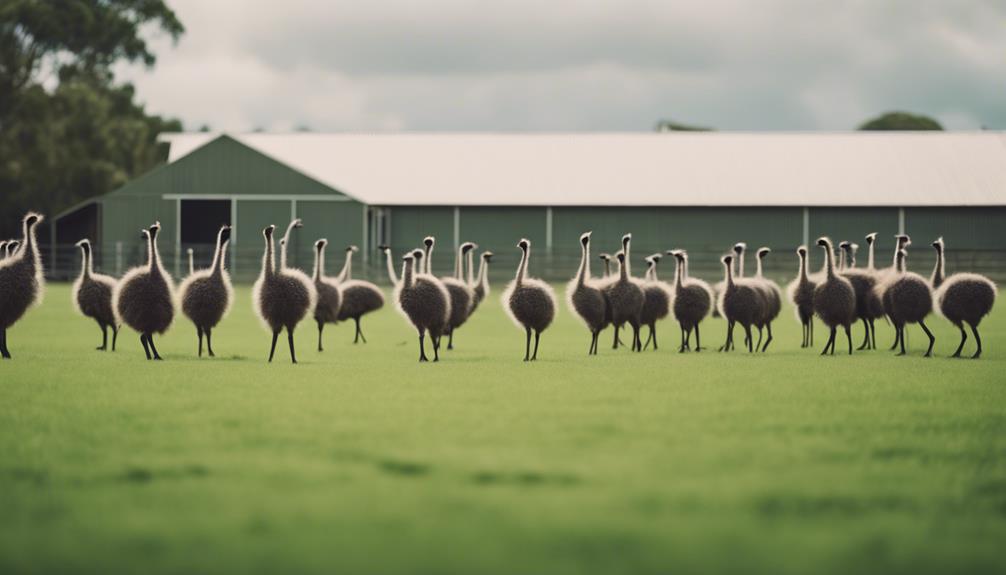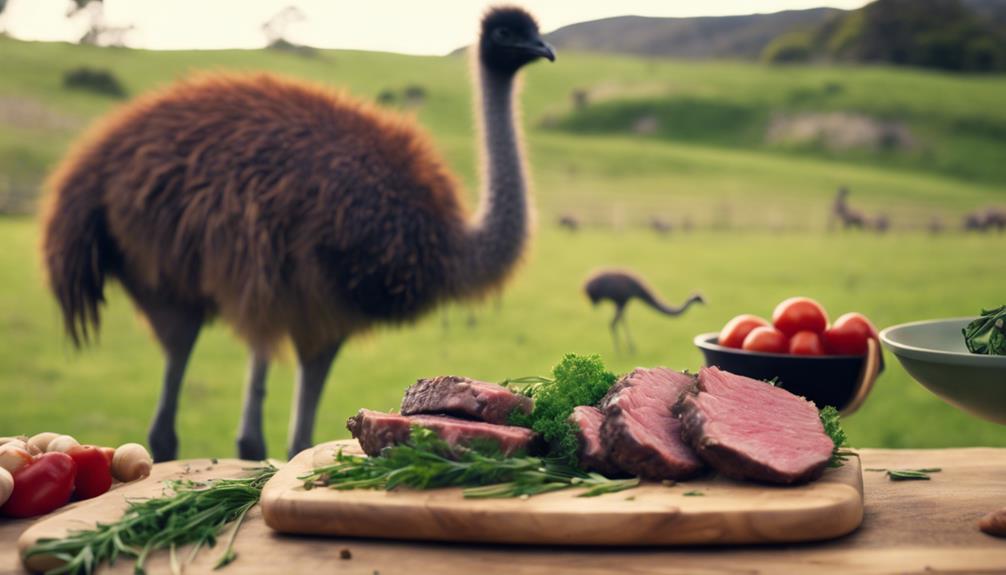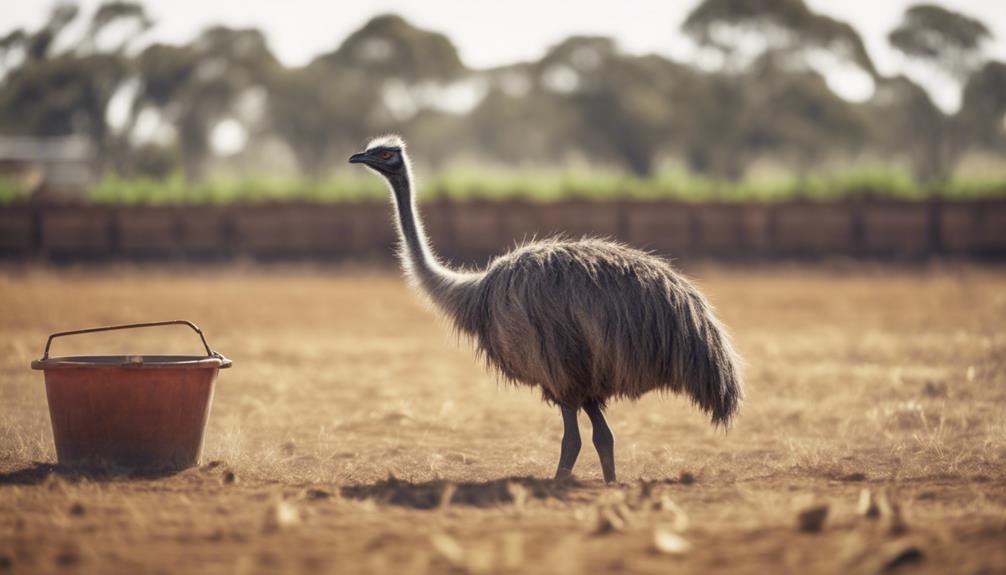
Imagine a symphony where each instrument plays a crucial role in creating harmony. Similarly, in the realm of sustainable agriculture, emu farming orchestrates a melody of benefits that resonate with the environment and economy. As you explore the intricacies of this practice, you will uncover a harmonious blend of innovation and tradition that promises a promising future.
Key Takeaways
- Emus require less water and feed, reducing resource consumption.
- Rotational grazing enhances soil health and biodiversity.
- Emu farming minimizes land modifications due to their adaptability.
- Emus efficiently convert feed to valuable products.
- Emu farming promotes sustainability and environmental stewardship.
Emu Farming: An Overview

Emu farming, as an industry, has steadily gained attention and interest due to its potential for high-quality products and sustainable practices. The emu, a flightless bird native to Australia, is primarily farmed for its lean meat, rich oil, and exquisite feathers. Emu meat is renowned for being low in fat and high in protein, making it a sought-after choice for health-conscious consumers. Additionally, emu oil is valued for its anti-inflammatory properties and is used in various skincare and medicinal products.
From an economic standpoint, emu farming presents opportunities for diversification in the agricultural sector. The birds are relatively low-maintenance, requiring minimal feed and space compared to traditional livestock. Emus are hardy animals, able to thrive in a range of climates, further enhancing their appeal to farmers. The market for emu products continues to grow, providing a lucrative avenue for entrepreneurs in search of sustainable business ventures.
Environmental Benefits of Emu Farming
With a growing body of research highlighting the positive impact of emu farming on environmental sustainability, it's evident that this industry offers significant advantages in terms of resource efficiency and ecological conservation.
Emu farming contributes to environmental benefits through various mechanisms. Emus consume a diet primarily composed of vegetation, requiring less water and feed compared to traditional livestock such as cattle. This results in reduced strain on water resources and lower greenhouse gas emissions associated with feed production.
Furthermore, emus are efficient converters of feed to meat, requiring fewer resources per pound of meat produced. Their low environmental footprint is also attributed to their ability to thrive in diverse climates, reducing the need for extensive land modifications. Emu farming practices such as rotational grazing can improve soil health and biodiversity, enhancing the overall ecosystem resilience.
Studies have shown that integrating emu farming into sustainable agricultural systems can lead to improved soil quality, reduced erosion, and increased carbon sequestration. Emu farming stands as a promising model for environmentally conscious agriculture, offering a path towards a more sustainable and resilient future.
Economic Viability of Emu Farming

Considering the economic landscape of modern agriculture, evaluating the financial viability of emu farming proves to be a critical aspect for stakeholders in the industry. Emu farming, when managed efficiently, can offer a range of economic benefits. The primary source of revenue in emu farming comes from various products such as meat, oil, feathers, and leather. The demand for these products is on the rise due to their perceived health benefits and eco-friendly nature.
Data indicates that the emu market has been steadily growing in recent years, presenting opportunities for profitability. Emus are known for their low maintenance requirements and high feed conversion rates, making them a cost-effective livestock option. Additionally, their ability to adapt to different climates and their relatively low susceptibility to diseases contribute to the economic sustainability of emu farming operations.
Furthermore, the byproducts of emus, such as their oil which is rich in omega-3, omega-6, and omega-9 fatty acids, have a strong market demand in various industries including cosmetics and pharmaceuticals, adding another layer of economic viability to emu farming. In conclusion, the economic outlook for emu farming appears promising for those willing to invest in this sustainable agricultural practice.
Social Impacts of Emu Farming
An evaluation of the social impacts of emu farming reveals its significance within the agricultural landscape. Emu farming not only contributes to the economy but also has profound social implications. Here are three key social impacts of emu farming:
- Community Engagement: Emu farming often involves local communities, creating opportunities for collaboration and shared knowledge. This engagement fosters a sense of unity and cooperation among community members, strengthening social bonds.
- Employment Opportunities: The growth of the emu farming industry provides job opportunities in various sectors such as farming, processing, marketing, and research. This influx of employment not only reduces unemployment rates but also enhances the overall socio-economic well-being of the community.
- Education and Awareness: Emu farming educates individuals about sustainable agricultural practices, animal husbandry, and biodiversity conservation. This heightened awareness leads to a more informed society that values environmental stewardship and ethical farming practices.
These social impacts underscore the multifaceted benefits of emu farming beyond its economic advantages, enriching the social fabric of communities and promoting a culture of sustainability.
Emus: Low-Maintenance Livestock

Emu farming stands out in the agricultural landscape for its unique characteristic of emus being low-maintenance livestock, requiring minimal care and resources compared to traditional livestock species. Emus are incredibly adaptable creatures, able to thrive in various environmental conditions with little intervention. Their resilience to harsh climates and diseases reduces the need for extensive veterinary care. Emus are also efficient feed converters, needing less food compared to other livestock for the same weight gain. This efficiency contributes to lower feeding costs and overall resource consumption.
Moreover, emus have a slow growth rate, reducing the need for frequent handling and management. Their calm demeanor and natural instincts make them easier to handle, further decreasing the labor required for their care. Emus are also known for their ability to forage for a variety of foods, decreasing the reliance on costly commercial feeds. Overall, the low-maintenance nature of emus makes them an attractive option for farmers looking to minimize operational costs and labor while maintaining sustainable agricultural practices.
Emu Farming and Sustainable Agriculture
With a focus on sustainability, emu farming integrates efficient practices to minimize environmental impact and promote long-term agricultural viability. Emu farming and sustainable agriculture go hand in hand, ensuring that the farming practices not only meet current needs but also preserve resources for future generations.
Here are three key aspects of emu farming that contribute to sustainable agriculture:
- Resource Efficiency: Emus are known for their low water and feed requirements, making them efficient converters of resources into valuable products.
- Land Preservation: Emus can thrive in various habitats, allowing farmers to utilize marginal lands that may not be suitable for traditional agriculture, thus reducing pressure on prime agricultural land.
- Ecosystem Health: Emus have a minimal impact on the environment due to their gentle grazing habits, which helps maintain biodiversity and soil health in the farming areas.
Emu Meat and Health Benefits

Emphasizing the nutritional benefits and potential health advantages, the consumption of emu meat presents a promising avenue for dietary enhancement. Emu meat is a rich source of high-quality protein, essential amino acids, and various vitamins and minerals.
With its low fat content and high concentration of omega-3 and omega-6 fatty acids, emu meat offers a healthier alternative to traditional red meats. Research indicates that incorporating emu meat into your diet may help lower cholesterol levels, reduce inflammation, and support heart health.
Moreover, the bioavailability of nutrients in emu meat is higher compared to other meats, making it a valuable addition to a balanced diet. Studies suggest that regular consumption of emu meat may contribute to weight management and overall well-being.
Emu Oil: A Valuable Byproduct
Exploring the extraction process and applications of emu oil provides valuable insights into its potential as a sustainable and beneficial byproduct of emu farming. Emu oil, derived from the fat of emus, is a rich source of essential fatty acids and has various applications that make it a valuable commodity in the market.
- Natural Anti-Inflammatory Properties: Emu oil contains high levels of omega-3, omega-6, and omega-9 fatty acids, which have been found to possess potent anti-inflammatory properties, making it a sought-after ingredient in skincare products.
- Skin Moisturizing and Healing Abilities: The oil is known for its ability to deeply penetrate the skin, providing long-lasting moisture and aiding in the healing of wounds, burns, and other skin conditions.
- Potential Health Benefits: Research suggests that emu oil may have potential health benefits when consumed orally, such as reducing cholesterol levels and improving overall heart health.
These characteristics underline the importance of emu oil as a valuable byproduct of emu farming, showcasing its versatility and potential in various industries.
Emu Farming Practices

Emu farming practices encompass a range of methods and considerations crucial for the sustainable management and welfare of emus in the farming environment. Proper nutrition is fundamental in ensuring the health and productivity of emus. A diet rich in grains, green forage, and supplements like calcium and grit is essential. Additionally, providing adequate space for emus to roam and exercise is vital to prevent stress and encourage natural behaviors.
Regular health checks by qualified veterinarians are imperative to monitor the overall well-being of the emus and promptly address any health issues. Proper handling techniques during routine tasks such as feeding, egg collection, and health inspections are crucial to minimizing stress and ensuring the safety of both the emus and farm workers.
Emu farming practices also involve sustainable breeding programs to maintain genetic diversity and improve desirable traits. Selective breeding based on performance metrics such as growth rates, egg production, and disease resistance plays a key role in enhancing the quality of the emu flock. By adhering to these best practices, emu farmers can promote the longevity and prosperity of their farms while upholding high standards of animal welfare.
Emu Farming: Market Demand
Market demand for emu products continues to play a significant role in shaping the landscape of emu farming practices. As a savvy entrepreneur looking to capitalize on this lucrative market, it's crucial to understand the current trends driving consumer interest in emu products.
Here are three key factors influencing market demand:
- Health Benefits: Consumers are increasingly drawn to emu products due to their high omega-3 fatty acid content, lean protein profile, and potential anti-inflammatory properties.
- Sustainability: The environmentally conscious consumer base is seeking sustainable alternatives to traditional meat products, with emu farming being recognized for its low environmental impact and efficient resource utilization.
- Cosmetic and Wellness Industry: The demand for emu oil in skincare and wellness products is on the rise, driven by its moisturizing properties and potential therapeutic benefits.
Emu Farming: Challenges and Solutions

Considering the complexities of sustainable farming practices, addressing the challenges faced by emu farmers is paramount to ensuring long-term success in the industry. Emu farming encounters obstacles such as high initial investment costs for infrastructure and specialized equipment, limited availability of quality feed, and the need for knowledgeable staff due to the unique nature of emu behavior and health requirements.
Furthermore, marketing emu products can be challenging due to the niche market and fluctuating demand. To tackle these challenges, implementing cost-effective strategies like cooperative purchasing of feed, sharing resources among farms, and investing in staff training can enhance overall efficiency and reduce operational costs. Embracing innovative marketing techniques, such as online platforms and partnerships with gourmet restaurants, can help expand market reach and promote emu products effectively.
The Future of Emu Farming
For the future of emu farming to thrive, strategic adaptation to evolving market trends and consumer preferences is essential. Embracing innovation and staying ahead of the curve will be crucial in sustaining growth and profitability in this industry. To ensure a successful future for emu farming, consider the following strategies:
- Diversifying Emu Products: Explore new product lines such as emu oil-based cosmetics or emu meat-based snacks to cater to a wider range of consumer preferences.
- Implementing Sustainable Practices: Emphasize eco-friendly farming methods and highlight the environmental benefits of emu farming to appeal to the growing segment of environmentally-conscious consumers.
- Leveraging Technology: Invest in advanced farming technologies like automated feeding systems or data analytics to improve efficiency, reduce costs, and enhance productivity.
Frequently Asked Questions
Can Emus Be Trained for Specific Tasks on the Farm?
Yes, emus can be trained for specific tasks on the farm. Their intelligence, adaptability, and strong memory make them suitable for various roles. With proper training techniques and consistency, emus can effectively perform farm tasks.
How Do Emu Farmers Ensure the Welfare of Their Birds?
To ensure the welfare of your birds, maintain spacious living areas, provide proper nutrition, access to clean water, and regular health check-ups. Implementing strict biosecurity measures and monitoring behavior can also help safeguard their well-being.
Are There Any Special Certifications Required for Emu Products?
To ensure quality and safety, special certifications like USDA Organic or EMU (Emu Meat United) may be required for emu products. These certifications signify adherence to standards and regulations that guarantee the authenticity and quality of the products.
What Is the Shelf Life of Emu Oil Products?
Emu oil products typically have a shelf life of 2-3 years when stored properly in a cool, dark place. This longevity is due to the oil's natural antioxidants and low levels of unsaturated fats.
How Do Emu Farmers Manage Breeding Seasons Effectively?
To manage breeding seasons effectively, you meticulously track reproductive cycles, monitor health indicators, and adjust environmental conditions. By optimizing breeding pairs, nutrition, and timing, you ensure high fertility rates and healthy offspring for sustainable emu farming success.
Conclusion
In conclusion, embracing emu farming as a sustainable practice is like planting seeds for a flourishing future.
Just as these majestic birds nurture the land and thrive in diverse environments, so too can farmers cultivate a more environmentally conscious agricultural industry.
By reaping the benefits of resource efficiency, economic viability, and social impact, the path to a greener tomorrow is clear.
Let emus lead the way to a more sustainable future for all.




